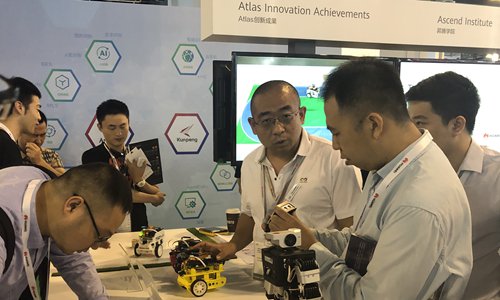HOME >> BUSINESS
Huawei launches ‘fastest’ AI cluster, challenging Google in computing
By Shen Weiduo in Shanghai Source:Global Times Published: 2019/9/18 20:28:40 Last Updated: 2019/9/19 0:51:38
Focus on computing could challenge industry leaders like Google: analysts

Visitors check out devices at the Huawei Connect 2019 in Shanghai on Wednesday. Photo: Shen Weiduo/GT
Chinese telecom giant Huawei Technologies on Wednesday unveiled its ambition in the computing sector by laying out its strategy for the $2 trillion sector and releasing what it claims to be the world's fastest artificial intelligence (AI) training cluster, the Atlas 900, a move that industry analysts said could challenge industry giants like Google.Huawei's foray into the computing area also comes after steady progress it made in 5G businesses and the proprietary operating system HarmonyOS, showing the industry giant's defiance and resilience amid the US intensified crackdown over the past year. it also marks another milestone for the company, said analysts.
"When most people think Huawei, they think connections...But our work doesn't stop at connectivity. Both connections and computing are key," Ken Hu (Houkun), deputy chairman of Huawei, spoke of Huawei's ambitions in the industry at the Huawei Connect 2019, an annual conference held by the industry giant in Shanghai, which runs from Wednesday to Friday.
"In terms of Huawei's investment, they're equally important. In the past, we mostly talked about connections. Today I'd like to focus on computing," Hu said. The future of computing is a massive market worth more than $2 trillion by 2023, where Huawei wants to carve out a space.
Huawei also introduced sectors it will focus on in the industry, including architectural innovation, investment in its all-scenario processors and the construction of an open ecosystem, which will involve an investment of another $1.5 billion in its developer program.
From the launch of its chip series and proprietary operating system to servers, to the computing layout, it is stepping up efforts to build up a comprehensive ability amid the US' intensified crackdown, Xiang Ligang, a Beijing-based veteran industry analyst, told the Global Times on Wednesday.
Xiang said these moves indicate the US crackdown will not contain the company's growth.
Apart from the official debut of its computing strategy, Huawei on Wednesday also unveiled the Atlas 900, which it claimed is the fastest AI training cluster that combines the power of thousands of its proprietary Ascend processors.
Building on the technical strength it has developed over the past decade, Huawei said that Atlas 900 takes only 59.8 seconds to train ResNet-50, a type of artificial neural network that is the gold standard for measuring AI training performance. This is 10 seconds faster than the previous world record.
"The layout in the computing sector and launch of training clusters mainly aim to serve as rivals to industry giants like Google, which now has the strongest computing power in the world. The world's major breakthroughs in the AI sector also come from Google," Jiang Junmu, chief writer at the telecom industry news website c114.com.cn, who covers Huawei closely, told the Global Times on Wednesday.
The biggest barrier to AI development is the lack of computing ability, but this is also where Huawei sees opportunity, Jiang said.
US ban effect
Being on a US blacklist since May 16, which restricts many US companies from selling products to Huawei, has cast a shadow on its businesses. While playing down the US effect, Hu said on Wednesday during the opening remarks that "Huawei has been doing just fine, like the good weather in Shanghai today."
He told reporters that Huawei has secured more than 50 contracts even amid the baseless security accusations from the US, and the number is still increasing. He estimated that 5G businesses will start contributing to revenue by the end of next year with the full roll-out of 5G services in China.
Still, insiders pointed out uncertainties for the giant. For instance, the company, which is also the world's second-largest smartphone maker, is scheduled to launch a high-end smartphone Mate 30 series on Thursday. Whether the new handset will be able to run Google's Android operating system and apps may affect its sales.
Huawei rotating chairman Eric Xu (Zhijun) said last month that while the impact of the US curbs was weaker than previously expected, there would still be at least $10 billion in losses in its smartphone unit's revenue this year.
An insider told the Global Times on the sidelines of the conference that it's unclear whether Huawei's own computing architecture and proprietary HarmonyOS could support its devices and meet consumer expectations.
"The company is doing OK, but it still has holes to be fixed in the face of unclear prospects," the insider said.
Newspaper headline: Huawei launches ‘fastest’ AI cluster
Posted in: COMPANIES